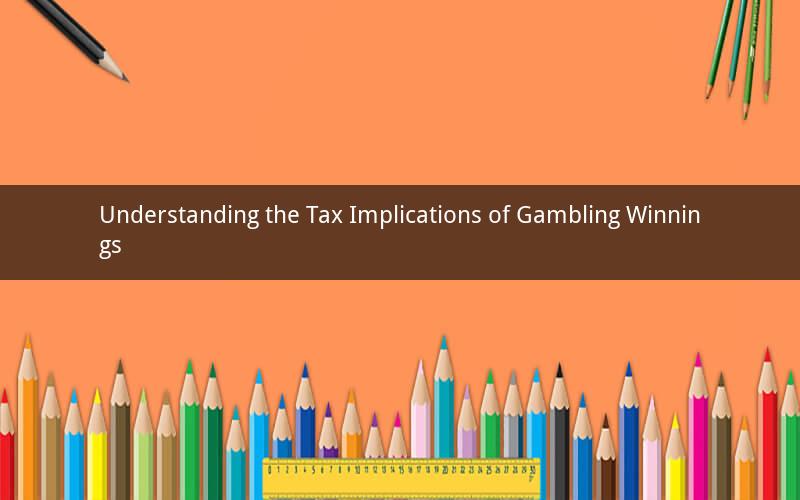
When it comes to gambling, the thrill of the win can often overshadow the thought of potential tax obligations. Many individuals may be unaware of the tax laws surrounding gambling winnings. This article delves into the various types of taxes due when gambling winnings are earned, providing a comprehensive guide to help you navigate this often overlooked aspect of gambling.
1. Income Tax on Gambling Winnings
Gambling winnings are considered taxable income in most countries, including the United States. This means that the amount you win from gambling must be reported on your tax return and is subject to income tax. The tax rate applied to gambling winnings can vary depending on your overall income and tax bracket.
In the U.S., the Internal Revenue Service (IRS) requires you to report all gambling winnings over $600, as well as any prizes you win. The IRS also requires that gambling operators, such as casinos or racetracks, report winnings over $5,000 to the IRS using Form W-2G.
2. Withholding Tax on Large Winnings
In many cases, gambling operators are required to withhold a portion of your winnings as tax. This is known as withholding tax and is typically calculated at a rate of 24% for most large winnings. If you win a substantial amount, the operator may withhold this tax directly from your winnings and send it to the IRS.
However, it's important to note that withholding tax is only required for winnings over a certain threshold, which can vary depending on the type of gambling activity. For example, winnings from slot machines, poker, and bingo may be subject to withholding tax, whereas winnings from raffles or lotteries may not.
3. Reporting Gambling Winnings
To report gambling winnings, you'll need to provide the gambling operator with your Social Security number or Individual Taxpayer Identification Number (ITIN). The operator will then issue you a Form W-2G, which will show the amount of your winnings and any tax withheld.
You must report all your gambling winnings on Schedule C (Form 1040) of your tax return. If you're using tax software, simply follow the prompts to enter your gambling winnings and the information from your Form W-2G. Keep in mind that any tax withheld by the operator will reduce your taxable income, but you may still owe additional tax depending on your overall income and tax bracket.
4. Deducting Gambling Losses
While gambling winnings are taxable, you may also be able to deduct your gambling losses from your taxable income. However, this is subject to certain limitations. In the U.S., you can deduct gambling losses up to the amount of your gambling winnings. Any losses beyond this amount cannot be deducted.
To claim your gambling losses, you'll need to maintain detailed records of your gambling activities, including the dates, locations, and amounts of your winnings and losses. You'll also need to provide this information to the IRS if requested.
5. International Tax Considerations
If you're a U.S. citizen or resident alien living abroad, you must still report your gambling winnings to the IRS. However, there are some special rules to consider when it comes to reporting foreign-source gambling winnings.
First, you'll need to determine if your foreign gambling winnings are subject to U.S. tax. In most cases, foreign-source gambling winnings are taxable in the same manner as domestic winnings. However, some countries have tax treaties with the U.S. that may provide relief from double taxation.
Second, you'll need to report your foreign-source gambling winnings on Form 1040NR (U.S. Nonresident Alien Income Tax Return) or Form 1040 (U.S. Individual Income Tax Return), as applicable.
Frequently Asked Questions:
1. Q: Are all gambling winnings taxable?
A: Yes, most gambling winnings are taxable income. This includes winnings from casinos, racetracks, lotteries, and other gambling activities.
2. Q: What is the tax rate on gambling winnings?
A: The tax rate on gambling winnings can vary depending on your overall income and tax bracket. In the U.S., the tax rate is the same as your regular income tax rate.
3. Q: Do I need to report small gambling winnings?
A: Yes, you must report all gambling winnings over $600, as well as any prizes you win. The IRS requires that gambling operators report winnings over $5,000 to the IRS using Form W-2G.
4. Q: Can I deduct my gambling losses?
A: Yes, you can deduct your gambling losses up to the amount of your gambling winnings. However, any losses beyond this amount cannot be deducted.
5. Q: Are foreign-source gambling winnings taxable in the U.S.?
A: Yes, foreign-source gambling winnings are taxable in the same manner as domestic winnings. However, some countries have tax treaties with the U.S. that may provide relief from double taxation.